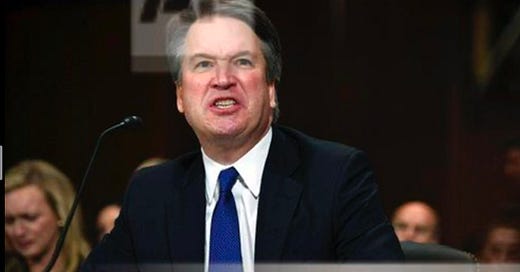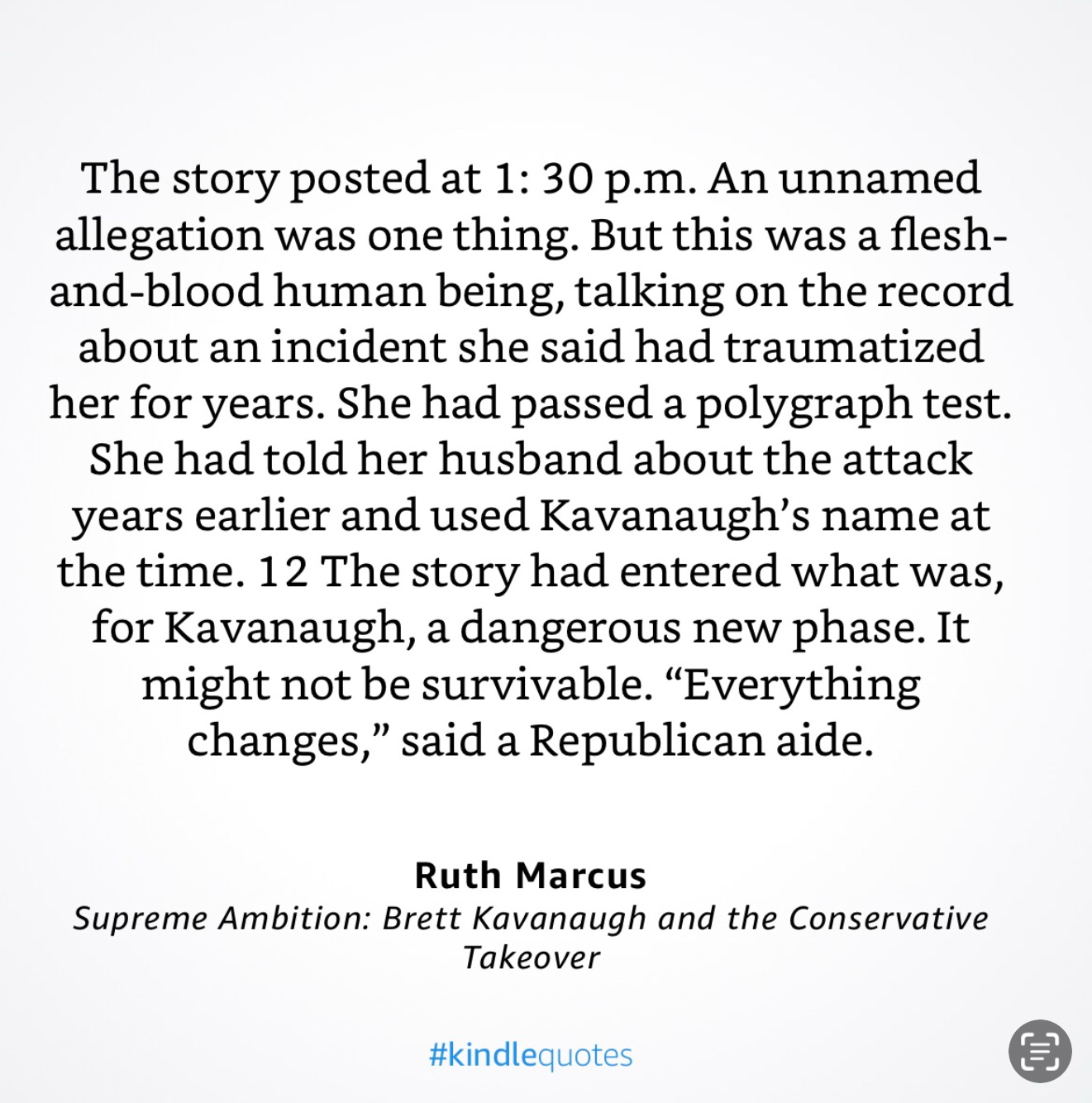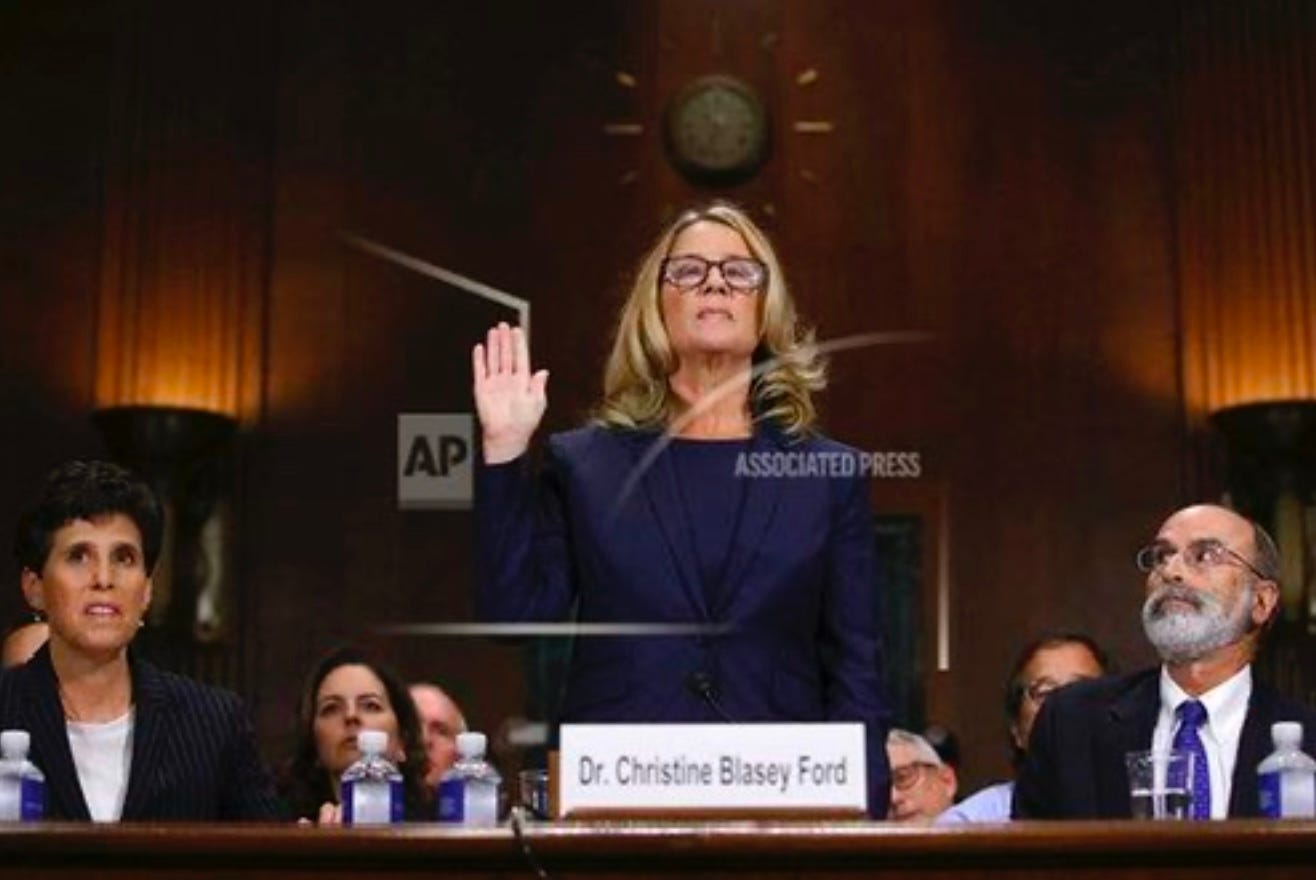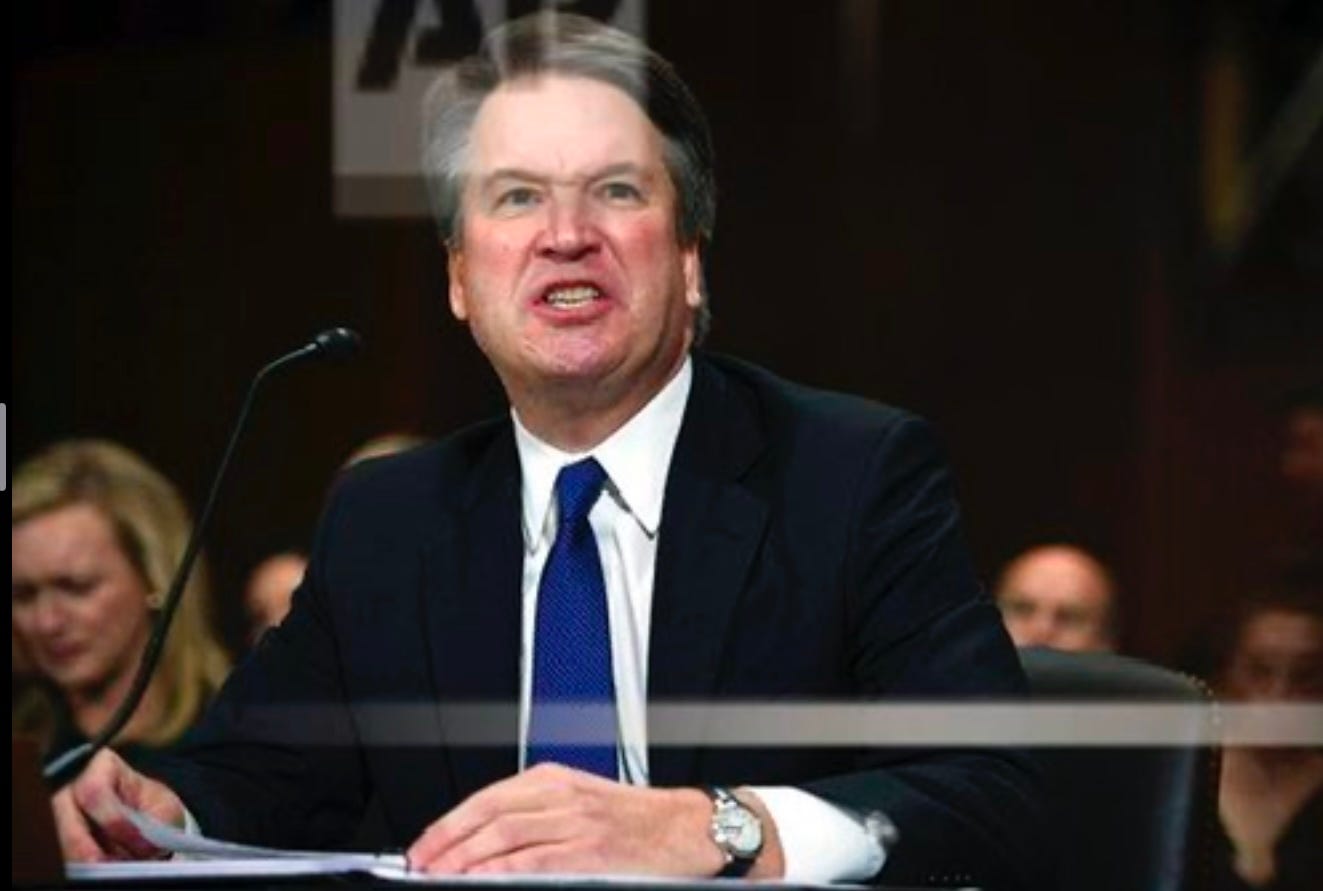“Remember Kavanaugh?” Lindsey Graham Asked. Yeah, Lindsey, I Do.
After Thomas/Hill, we thought things would be different. The Kavanaugh hearings proved otherwise.
Lindsey Graham is in a “good place” with Pete Hegseth. That is, “unless something that I don’t know about comes up.”
It’s a mental strain to imagine what more could come up. Jane Mayer’s exhaustive account of Hegseth’s chronic falling-down drunken-ness, vile behavior toward women, irresponsibility on the job, openly misogynist and Islamophobic views, and (highly) credible accusation of rape, leaves little else that might be disqualifying except, perhaps, (and in Trump’s world, only “perhaps”) murder.
Lindsey, though, considers none of the dozens of reports from Hegseth’s history disqualifying. It’s a virtual mountain of misconduct of an amazingly diverse variety, but naturally the corporate media has focused on the rape allegation, which Kristen Welker, on “Meet the Press,” questioned Graham about this past Sunday. He defended Hegseth, but covered his ass: Of course, of course, he’d “want to know if anybody nominated for a high-level job in Washington legitimately assaulted somebody.” But that would require the accuser showing up, publicly identifying herself, and subjecting herself to interrogation.
What fun for her! (And, as Hegseth’s lawyer helpfully reminded, would put her “at peril of a defamation lawsuit”—adding that Hegseth’s legal team would consider bringing a civil lawsuit against the woman if Hegseth is not confirmed.) So far, a non-disclosure agreement has prevented any public circus/evisceration. But now, with Hegseth apparently willing to release her from the agreement, bring it on, says Lindsey. Let her come forward with her allegations and “we’ll decide if it’s credible.”
“We”? What ‘we,’ white man? And why does the phrase “legitimate assault” ring in my ears like a lingering case of tinnitus? Oh that’s right: Todd Akin, the would-be senator who argued that women rarely get pregnant from a “legitimate rape”: “If it’s a legitimate rape, the female body has ways to try to shut that whole thing down.”
In those before days, way back in 2012 PT1, Akin was forced to withdraw his candidacy when just about everyone—media, politicians on both sides of the aisle, feminist commentators—recoiled in horror (and amazement over his stupidity.)
But these are different times. Pete Hegseth (not to mention Donald Trump) has said far worse. And Welker didn’t call him out, either on the assault skepticism or the ridiculous caution to “Remember Kavanaugh! We're not going to let that happen to Pete. You're not going to destroy his nomination based on anonymous allegations.”
Hmm. “Destroy his nomination”? Although perhaps it was just a nightmare (I wish it was just a nightmare) I’m pretty certain that Kavanaugh now sits on the Supreme Court, ruling in ways that he promised/lied he never would during his confirmation hearings.
*****************
The Kavanaugh case is, however, highly instructive—although not in the way Lindsey implies.
Let’s review, shall we, class? (Lindsey, take your finger out of your nose. I’m speaking now.)
On July 9, 2018, President Donald Trump nominated Brett Kavanaugh, then a 53-year-old appeals court judge who was known to be a particularly enthusiastic Clinton-hater, to fill the vacancy created by the retirement of Justice Anthony Kennedy. Republicans were thrilled, praised Trump, and urged a quick hearing and vote.
On September 4, the Senate Judiciary Committee began the hearing. The four days that followed were largely focused on Kavanaugh’s positions on gun rights and reproductive freedom. Kavanaugh, in keeping with the strategy employed by Neil Gorsuch (and later, Amy Comey Barrett), lied (as we now know with certainty), claiming that by virtue of stare decisis2Roe V. Wade would be protected from being overturned. The protestors who stood silently outside the hearing room in the red gowns and white bonnets of handmaids knew better, as did Kamala Harris. A feminist high point of the hearings occurred during her questioning:
What a “brava” moment for Kamala that was! I’m sure hundreds of thousands of women jumped up from their couches, pumped their fists, shouting “YES”!! For many of us, it was the moment we began to get interested—really interested—in Senator Harris. Was there a new, brilliant, unafraid-to-show-your-feminism champion in town?3
The abortion issue didn’t take down Kavanaugh, though. As usual, the male senators fretted over Lisa Murkowski and Susan Collins’ “liberalism.” Collins had made it clear, before the hearing, that she “would not support a nominee who demonstrated hostility to Roe v. Wade because that would mean to me that their judicial philosophy did not include a respect for established decisions, established law.” In the end, however, Collins voted to confirm (Murkowski didn’t, but not, as we’ll see,because of the abortion issue.) Kavanaugh was allowed—as both Gorsuch and Barrett were—to get away with the implication that “respect for established law” would protect Roe, which Kavanaugh described as “an important precedent” that’s “been reaffirmed many times.” We now know (and Collins should have known at the time) that Kavanaugh’s deference to stare decisis was equivalent to campaign bullpucky.
After the hearing, Kavanaugh appeared to be headed toward a relatively easy confirmation by the (narrowly) Republican dominated senate. Less than two weeks later, however, psychology professor Christine Blasey Ford went public—extremely reluctantly—with allegations that as a teenager in the early 1980s, Kavanaugh and his friend Mark Judge had sexually assaulted her during a party in the Washington, D.C., suburbs.
As Ruth Marcus recounts in Supreme Ambition (to which I refer you for a far more detailed account than I can provide here)4Ford described how Kavanaugh, along with Judge, pushed her into a bedroom, locked the door, and played loud music. “Kavanaugh was on top of me while laughing with Judge, who periodically jumped onto Kavanaugh. They both laughed as Kavanaugh tried to disrobe me in their highly inebriated state. With Kavanaugh’s hand over my mouth, I feared he may inadvertently kill me.”
When Judge jumped on Kavanaugh and knocked them all off the bed, Ford “jumped up and got out of there” immediately. For years, she wrestled with the memory privately, with close friends and in therapy. But when Kavanaugh became an increasingly public figure, she began to feel she had a civic duty to speak up:
She knew he had become a prominent federal judge; she knew his name was on Trump’s Supreme Court list. But the idea of his being tapped for the spot seemed remote, especially after Trump chose Gorsuch, another Georgetown Prep graduate, to fill the Scalia vacancy. Surely Trump wouldn’t go back to the same generation of the same small Catholic boys’ school twice in a row. Then came Kennedy’s announcement and, in the following days, the growing chatter: Kavanaugh was on the short list. Kavanaugh was the leading contender. “I started panicking,” Ford said…One morning a few days after Kennedy’s retirement, Ford pulled aside a beach friend, Jim Gensheimer, a photojournalist, and poured out her story. She felt a responsibility—“ civic duty” was the phrase Ford used repeatedly—to alert someone. But Ford was not a person who craved the limelight—she hated it. Even standing up in front of her statistics students felt like an ordeal before she got to know them better over the course of a year. Flashes of the Thomas-Hill hearings went through her mind—Hill sitting alone at the witness table as the cameras whirred. Ford had been in that very hearing room for high school field trips; she had watched a bit of the hearings when she was a master’s degree student in psychology, living in Malibu. “I’m not sitting in that huge room and have people interview me,” Ford thought. “That’s never going to happen….”
Eventually, of course, that’s just what did happen.
The story first emerged as an unnamed accusation (for details on how this came about, see Marcus), which Kavanaugh vehemently denied, while his Republican colleagues insisted that they just “couldn’t imagine” him doing anything like that. The New York Times was dismissive: NEW KAVANAUGH DISCLOSURE SHOWS LITTLE SIGN OF IMPEDING HIS NOMINATION. But when, on September 14, Ronan Farrow and Jame Mayer published all the disturbing details—without Ford’s name—things changed.
The ever-camera-ready Lindsey Graham was especially agitated: “This has been a drive-by shooting when it comes to Kavanaugh … I’ll listen to the lady, but we’re going to bring this to a close.” The call for a more extensive FBI check was deemed “excessive.” What could be learned 35 years after the fact?5 In reality, they all were afraid more allegations would pop up (which they did, only to be ignored by the committee.) But Mitch McConnell told them to “keep the faith” and “plow right through it,” assuring Trump on the telephone that he was “stronger than mule piss” and would make sure Kavanaugh was confirmed.
In fact, the Republicans, arguably, were not only terrified of the FBI looking more deeply into Kavanaugh’s behavior—which they knew included a great deal of drunken partying and questionable behavior (possibly including penis-flashing) and were hoping Dr. Ford wouldn’t even show up on to testify. Then they could say “We did all we can. Time to forget this and vote.”
But before that, Kavanaugh made sure to make the most of the freshly excited media, claiming in an interview with Martha MacCallum on Fox (wife by his side) that he’d been involved lifelong in “promoting dignity and equality for women,” starting with the women who knew him when he was fourteen years old. (FOURTEEN YEARS OLD?) and that he was a virgin through high school and for “many years after. (OK, maybe it’s a gender thing, but I remember exactly when it was that I “lost” my virginity.)
On September 27 the Senate Judiciary Committee reconvened to hear testimony from both Kavanaugh and Ford. Over 20 million people watched the hearing on television, with millions more streaming it on their computers and phones. In preparation, the Republicans had flooded the media with smarmy, disingenuous comments that their biggest concern was to “make her (Dr. Ford) as comfortable as possible” and her family feel “safe” when she testified.
Ford appeared first. Describing herself as “terrified,” she was even more reserved than Anita Hill had been. She hadn’t expected her testimony to be televised and clearly wasn’t comfortable with the eye of the nation on her. But to the Republicans’ chagrin, her very discomfort made her all the more credible. "She sounds like your friend's mom, she looks like your friend's mom, she doesn't look crazy," said one aide. And a member of Grassley's staff: "This is not good. RIP, Brett. We're just thinking she killed it. Kavanaugh better match that.” Another: “We were one tick away from 'he's smoked.'"
After Ford’s appearance, many journalists were pronouncing Kavanaugh’s confirmation doomed. They hadn’t counted on Kavanaugh pulling out the stops with what we now recognize as Donald Trump’s signature performance when accused: make yourself the victim.
He learned it, arguably, from Clarence Thomas.
*******************
Thomas had arranged it so that his appearances were on a Friday night and Saturday, when audiences would be much larger, and—surprising Anita Hill, who had expected to appear after Thomas—made sure he got the last word. In his response, impassioned and furious, brimming with self-justification, Thomas claimed the charges—“This sleaze, this dirt”—were a politically motivated concoction, deliberately leaked to the media. “And this committee and this body,” he went on, “validated it and displayed it in prime time over our entire nation.”
This is a circus. It's a national disgrace. And from my standpoint, as a black American, it is a high-tech lynching for uppity blacks who in any way deign to think for themselves, to do for themselves, to have different ideas, and it is a message that unless you kowtow to an old order, this is what will happen to you. You will be lynched, destroyed, caricatured by a committee of the U.S. Senate rather than hung from a tree.[1]
It was a brilliant strategy; the implication was that to vote against Thomas was to be a racist. But Thomas undoubtedly knew that besides the senators, thousands of male viewers were also watching, identifying and sympathizing with him, especially if they were Black. (The fact that Hill was also Black made no difference; in this scenario, she was “woman.”)
Women were watching, too, though. And our outrage even made it to a prime-time sitcom. In “The Strange Case of Anita Hill and Clarence Thomas,” Designing Women made it clear whose side they were on. I could imagine writer Linda Bloodworth-Thomason (the show’s producer and writer) saying to herself, “The hell with it. It’ll be funny, but it’s damn well going to make a serious point too. And it’s going to be accurate, if only for the historical record.”
So, Mary Jo (Annie Potts) wore a T-shirt emblazoned with “HE DID IT” and Julia Sugarbaker (Dixie Carter) stormily took on the arguments and comments made against Hill. Although the show represented the other point of view (Carlene wears a T-shirt insisting “SHE LIED”), it’s done via the show’s ditzes Alison (Julia Duffy) and Carlene (Jan Hooks), who are made fun of, and lest one be wondering about the show’s politics, it ends (well, almost ends) after Thomas is confirmed, with a rousing speech by Mary Jo in which she—gasp—even uses the term “feminist”:
All we want is to be treated with equality and respect. Is that asking too much? I’m sorry, I don’t mean to be strident and overbearing, but, you know, nice just doesn’t cut it anymore. I’m mad because we’re fifty-one percent of the population and only two percent of the United States Senate . . . I’m mad because in a Seminole, Oklahoma, police station, there’s a poster of a naked women that says “women make bad cops.” I’m mad because in spite of the fact that we scrub America’s floors, wash the dishes, have all the babies, and commit very little of the crime, still we only make fifty-eights cents on the dollar. I don’t know about the rest of you women out there, but I don’t give a damn anymore if people think that I’m a feminist or a fruitcake.[i]
Sure, “feminist or fruitcake” came with a laugh track—this was prime-time comedy, after all. But the episode ended with a pastiche of clips from the hearing and a final still photograph. The clips: Arlen Spector accusing Hill of lying; John Danforth calling her an “erotomaniac”; John Doggett portraying her as a woman bitter over unrequited love for Thomas; the swearing in ceremony, with Bush’s declaration that America is founded on the idea that all men are created equal. The concluding still: a shot of Anita Hill herself, silent. I can’t remember whether I clapped or sat with jaw clenched; I do remember that it was the first time I felt a sitcom had passed through the wall of “it’s just a TV show” and reached out to me
.
When I had been sexually harassed by a professor in the 1970s, we didn’t even have a word for it. But the scoffing dismissal of the male students, their pointing out that I “didn’t exactly dress like a nun,” and the chairman’s permission for me to drop the course provided my reason was “personality differences,” all came back when I watched the hearings. And I wasn’t alone. Sexual harassment became a high-voltage topic of discussion, 1992 was declared the Year of the Woman (yes, we’ve had more than one of those) and a significant number of women (which some called “the Anita Hill Class”) were elected to Congress.
We thought everything would change. But as it turned out, the 2018 Kavanaugh hearings were PTSD-time for second-wave feminists.
Claiming, unbelievably, that sex was a topic he never imagined would come up at a judicial confirmation hearing (apparently he was asleep while the rest of us were riveted—as the broadcasters liked to say—to our TVs during the Thomas-Hill hearings) Kavanaugh adopted Clarence Thomas’s playbook as the outraged and aggrieved innocent. Actually, he went even further. While Thomas’s words were full of fury, his performance style was contained. Kavanaugh shouted and sputtered and at various times dissolved into tears as he described the process as a national disgrace, a circus, and a deliberate attempt to destroy him. Though there was no metaphor as potent as “lynching,” Kavanaugh’s narrative drew on Trump’s own favorite whine: the witch hunt:
You have tried hard. You’ve given it your all. No one can question your efforts. Your coordinated and well-funded efforts to destroy my good name and destroy my family will not drag me out. The vile threats of violence against my family will not drive me out. You may defeat me in the final vote, but you’ll never get me to quit. Never.[2}
I will spare the reader Kavanaugh’s sentimental reminiscences about the calendar he kept during high school, his fondness for beer, the goofy things he did with his friends, the disaster that was his yearbook. Now his life was ruined; he may never be able to coach again, never be able to teach again. He was close to tears as he talked about his daughter and wife. He was disrespectful and accusatory both to Sheldon Whitehouse and to Amy Klobucher. He insinuated, without any evidence, that committee Democrats had leaked the Ford allegations.
Very few Republicans—a notable exception was Lisa Murkowski, who went on to vote against confirmation because of Kavanaugh’s performance—expressed concern over Kavanaugh’s tantrum. (If he’d been a woman, of course, he’d have been judged hysterical, and certainly not emotionally fit to serve on the Supreme Court.) Most, at least outwardly, were jubilant—as was Donald Trump, who apparently had given Kavanaugh a talking-too before his appearance. “He listened to me,” he proudly told an attendee at a fundraiser that night. And on Fox News, KellyAnne Conway praised Kavanaugh, astutely recognizing that he had “channeled his inner Clarence Thomas and his inner Donald Trump.”
On October 6, Kavanaugh was confirmed to the Supreme Court; the final vote in the Senate was 50-48.
***************
Shortly after the confirmation, I wrote on Facebook:
When politics are involved, I don’t automatically assume sexual harassment or abuse charges are true. But I do expect them to be investigated thoroughly; letting the woman speak and then trashing her testimony without benefit of such an investigation is a farce. This is just what happened with the Kavanaugh hearing, as an FBI investigation and the calling of witnesses was blocked by the Republican-controlled committee, reducing the proceedings to a “he said/she said” in which they made sure Kavanaugh dominated.
Trump did his part too. I’d thought “lock her up” and “grab her by the pussy” was as low as he could go. I was wrong. As Maggie Haberman and Peter Baker reported in The New York Times:
“Playing to the crowd of thousands gathered to cheer him on, the president pretended to be Blasey testifying before the Senate Judiciary Committee last Thursday. “Thirty-six years ago this happened. I had one beer, right? I had one beer,” said Trump, channeling his version of Blasey. His voice dripping with derision, he then imitated her being questioned at the hearing, followed by her responses about what she could not recall about the alleged attack.
“How did you get home? I don’t remember. How’d you get there? I don’t remember. Where is the place? I don’t remember. How many years ago was it? I don’t know. I don’t know. I don’t know. What neighborhood was it in? I don’t know. Where’s the house? I don’t know. Upstairs, downstairs, where was it? I don’t know,” Trump said, as the crowd applauded. “I don’t know — but I had one beer. That’s the only thing I remember.””
Trump wasn’t the only one to mock Dr. Ford for “gaps” in memory. At the same time, “I don’t remember” was seen as a totally legitimate response when it came from Kavanaugh himself, his friend Mark Judge and others who’d been at the party. After all, it was 35 years ago. So long ago. Who could expect them to remember every detail?
The grim fact is that over and over during the hearing “equal treatment” was shown to be a fiction. Imagine Ford as a man accusing a drunk K of holding him down and attempting to rob him at knifepoint in an alley. Would “boys will be boys” be seen as excusing that behavior? Would the denial of an equally drunk witness be seen as credible? Would the FBI check be allowed to be as cursory? Would we hear about how “unblemished” K’s record is, or how restrained he is in the courtroom? Would the GOP not seriously consider withdrawing his name? Would K’s frothing-at-the-mouth not be seen as some indication that he just might have the wrong “temperament” for the Supreme Court? That his past just might not be so “unblemished”?
But attempted robbery is, after all, a crime & we have to take it very seriously. Even the GOP couldn’t get away with the sham FBI “background” probe they slid by. But sexual assault? When the perp is 17 & drunk? & the accuser is just a girl? And hey, she wasn’t even raped!
The fact is that a Christopher Ford would have been treated very differently than Christine Ford. That’s why women need more than just to be “heard” or “believed.” It makes it too easy for them to just give us a “voice” (as they did with Ford) and then crap on us anyway.
********************
So Lindsey, I do “remember Kavanaugh”—and I’m going to be watching very closely, as y’all decide who is “credible” and what kind of behavior is appropriate for a Supreme Court Justice. Right now, it’s looking as though we don’t even need the theatrics of the Kavanaugh hearing or the “charm offensive” that Pete Hegseth’s years as a television personality have well-prepped him for. We’ve got calls from Donald Trump and threats of being primaried (and worse) doing the job pretty effectively without a “boys will be boys” defense.
Don’t expect silence, though, from those of us who know better.
[1] Hearing of the Senate Judiciary Committee on the Nomination of Clarence Thomas to the Supreme Court, September 13, 2013, Electronic Text Center, University of Virginia Library, October 11, 1991.
[2] Kavanaugh Hearing: Transcript, Washington Post, September 17, 2018.
Pre-Trump
The principle of letting well-settled law stand. In this case, Roe had been in place for fifty years.
In the hearing, Kamala framed the abortion issue the way I’d always seen it: not as about “choice” or “privacy” but a matter of equal treatment under the law. The double-standard is strewn throughout our legal system, which values bodily autonomy so highly that no one can be forced to take a simple blood test (for blood or bone compatibility, for example)—not even when the life of another person hangs in the balance. Yet centuries of ideology and legal decisions have allowed for—and often forced—women’s bodies to be controlled and invaded, supposedly in the interests of fetal life.
We don’t hear much about the equality issue anymore, however. As the consequences of Dobbs and the Trump abortion bans have shown themselves to be even more dire than foreseen, the fight for reproductive freedom has shifted its focus from equality and “choice” to threats to women’s lives, health, and future fertility. At the DNC and campaign rallies, women tell of bleeding on their bathroom floors, traveling long distances with raging infections, having to wait until they are close to death before doctors, afraid of being jailed, are willing to treat them.
While such post-Dobbs horrors aren’t as rare as people might have expected, the vast majority of abortions are not sought to intervene in a health crisis, and I wonder if the emphasis on emergency care isn’t obscuring the “everyday” importance of reproductive freedom to legal, social, and economic equality (not just physical safety.)
Ruth Marcus, Supreme Ambition, NY: Simon and Schuster, November 2020.
Orin Hatch and Chuck Grassley, who had been on the Thomas/Hill committee, knew there was nothing “excessive” about the “demand” (as they put it) for a thorough investigation. It was done then. Orin Hatch had even said at the time it was “right thing to do.”








thank you for sharing this. We need to be reminded of the history of the assault against women and we can't let it derail our efforts for using our voice to protest the misogyny.
Thanks Susan for this article. PH's confirmation would be another insult to women, to men who care about women, and to decency. You have me riled up again.